最新人教版9年级英语第六单元知识点归纳
- 格式:doc
- 大小:30.00 KB
- 文档页数:3
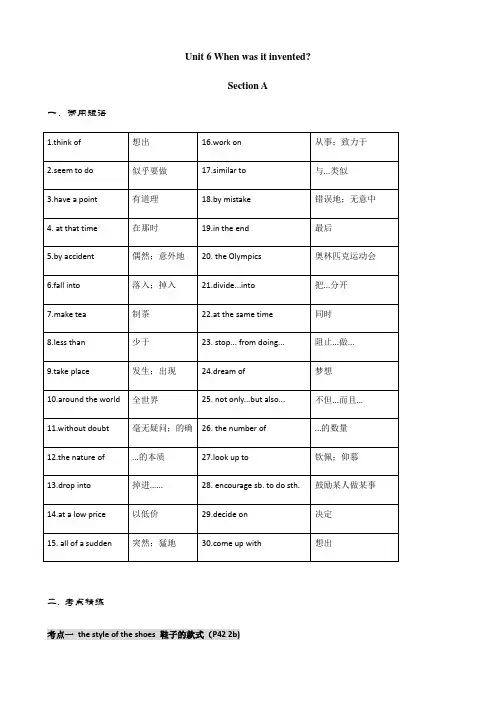
Unit 6 When was it invented?Section A一.常用短语二.考点精练考点一the style of the shoes 鞋子的款式(P42 2b)(1)style词性_________,意为__________。
常用短语in style意为“时髦的”,其反义短语为_____________,意为“过时的”。
名词/“样式;款式”/out of style☑ This year's style in dresses is different from last year's.今年的裙子样式与去年的不同。
☑ Her clothes are always in style.她的衣服总是很时髦。
(2)style 做名词,还可意为___________。
“方式”☑ Our children need new learning styles.我们的孩子需要新的学习方式。
考点二With pleasure! 非常愿意!(P42 2d)pleasure词性_________,意为___________。
名词/“高兴;愉快”☑ Watching the 2016 Summer Olympics gave him great pleasure.观看2016年夏季奥运会给他以极大的愉悦。
【辨析】with pleasure与my pleasure☑-Could you help me with my English?你能帮我学习英语吗?-With pleasure.当然可以。
☑ Thanks for helping me.谢谢你帮助了我。
-My pleasure./It's a pleasure.别客气。
考点三Think about how often it's used in our daily lives. 想想看,在我们的日常生活中它被使用得多么频繁。
(P42 2d)daily此处词性为_________,意为___________。
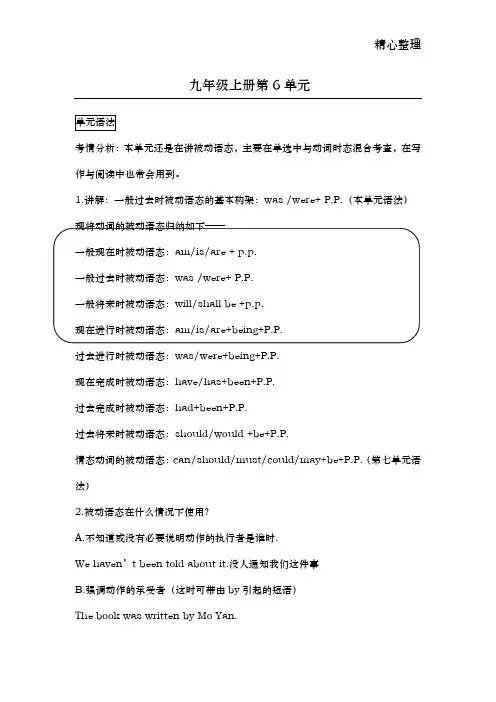
精心整理九年级上册第6单元考情分析:本单元还是在讲被动语态,主要在单选中与动词时态混合考查,在写作与阅读中也常会用到。
A.不知道或没有必要说明动作的执行者是谁时.We haven’t been told about it.没人通知我们这件事B.强调动作的承受者(这时可带由by引起的短语)The book was written by Mo Yan.C.不愿说出动作的执行者是谁He was asked to give a speech about how to study English well.3.被动语态的注意事项:A. there be 结构没有被动语态B.主句中宾语是反身代词的没有被动语态7.fall into落入,陷入。
比较容易搞混淆的还有:fall down摔倒,fall off掉下,fall asleep入睡8.辨析:remain是动词,保持不变/仍然是;remind动词,提醒,remind to do sth,remind···of。
9.辨析:【了解】家;translation名词,翻译15.all of a sudden突然,猛地=suddenly16.by mistake无意中,错误地17.much-loved 深受喜爱的,复合形容词18.divide···into···把····分成·····19.stop···from···阻止····做····20.dream of/about 梦想···向往···· (of/about是介词,后面的动词用-ing 形式)21.look up to 倾佩/仰慕/抬起头看练习:(15年上海中考)以“I want to invent ______"为题,写一篇不少于60个词的短文,标点符号不占格参考词汇:1.It can be used to ...with the help of our robot doctors,?you can talk to your personal doctor one to one whenever you want.In short, family doctor robots can?make great contribution to?our society.精彩亮点分析:亮点一:全文巧用“first, furthermore, in short”等连接词,把家庭机器人医生的好处写的非常清晰,让阅卷老师一目了然。
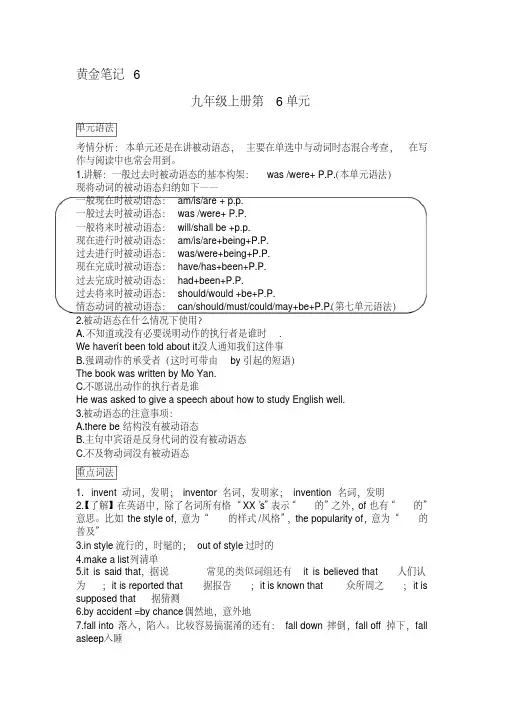
黄金笔记6九年级上册第6单元单元语法考情分析:本单元还是在讲被动语态,主要在单选中与动词时态混合考查,在写作与阅读中也常会用到。
1.讲解:一般过去时被动语态的基本构架:was /were+ P.P.(本单元语法)现将动词的被动语态归纳如下——一般现在时被动语态:am/is/are + p.p.一般过去时被动语态:was /were+ P.P.一般将来时被动语态:will/shall be +p.p.现在进行时被动语态:am/is/are+being+P.P.过去进行时被动语态:was/were+being+P.P.现在完成时被动语态:have/has+been+P.P.过去完成时被动语态:had+been+P.P.过去将来时被动语态:should/would +be+P.P.情态动词的被动语态:can/should/must/could/may+be+P.P.(第七单元语法)2.被动语态在什么情况下使用?A.不知道或没有必要说明动作的执行者是谁时.We haven’t been told about it.没人通知我们这件事B.强调动作的承受者(这时可带由by引起的短语)The book was written by Mo Yan.C.不愿说出动作的执行者是谁He was asked to give a speech about how to study English well.3.被动语态的注意事项:A.there be 结构没有被动语态B.主句中宾语是反身代词的没有被动语态C.不及物动词没有被动语态重点词法1.invent 动词,发明;inventor 名词,发明家;invention 名词,发明2.【了解】在英语中,除了名词所有格“XX’s”表示“···的”之外,of也有“···的”意思。
比如the style of,意为“···的样式/风格”,the popularity of,意为“···的普及”3.in style流行的,时髦的;out of style过时的4.make a list列清单5.it is said that,据说···常见的类似词组还有it is believed that···人们认为···;it is reported that···据报告···;it is known that···众所周之···;it is supposed that···据猜测···6.by accident =by chance 偶然地,意外地7.fall into落入,陷入。
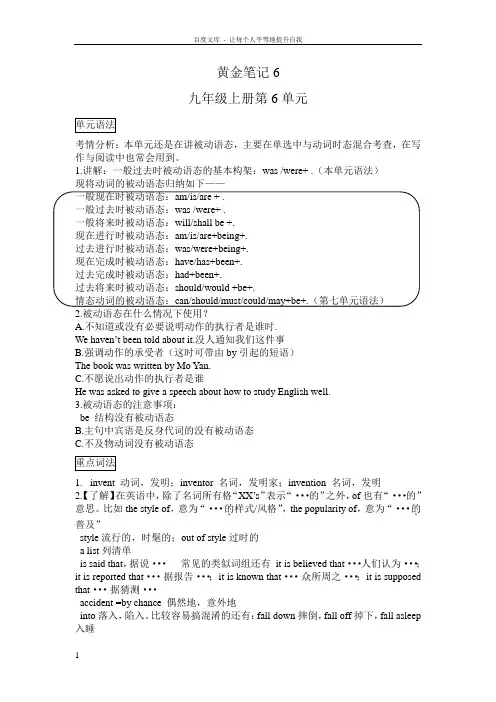
黄金笔记6九年级上册第6单元单元语法考情分析:本单元还是在讲被动语态,主要在单选中与动词时态混合考查,在写作与阅读中也常会用到。
1.讲解:一般过去时被动语态的基本构架:was /were+ .(本单元语法)现将动词的被动语态归纳如下——一般现在时被动语态:am/is/are + .一般过去时被动语态:was /were+ .一般将来时被动语态:will/shall be +.现在进行时被动语态:am/is/are+being+.过去进行时被动语态:was/were+being+.现在完成时被动语态:have/has+been+.过去完成时被动语态:had+been+.过去将来时被动语态:should/would +be+.情态动词的被动语态:can/should/must/could/may+be+.(第七单元语法)2.被动语态在什么情况下使用?A.不知道或没有必要说明动作的执行者是谁时.We haven’t been told about it.没人通知我们这件事B.强调动作的承受者(这时可带由by引起的短语)The book was written by Mo Yan.C.不愿说出动作的执行者是谁He was asked to give a speech about how to study English well.3.被动语态的注意事项:be 结构没有被动语态B.主句中宾语是反身代词的没有被动语态C.不及物动词没有被动语态重点词法1.invent 动词,发明;inventor 名词,发明家;invention 名词,发明2.【了解】在英语中,除了名词所有格“XX’s”表示“···的”之外,of也有“···的”意思。
比如the style of,意为“···的.样式/风格”,the popularity of,意为“···的.普及”style流行的,时髦的;out of style过时的a list列清单is said that,据说···常见的类似词组还有it is believed that···人们认为···;it is reported that···据报告···;it is known that···众所周之···;it is supposed that···据猜测···accident =by chance 偶然地,意外地into落入,陷入。
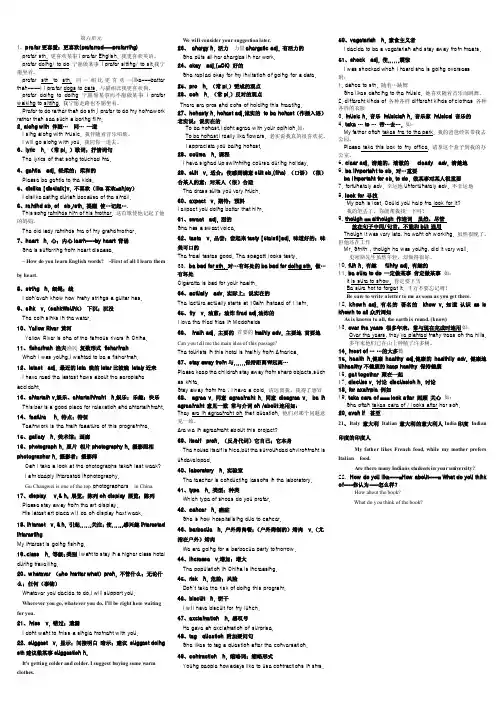
第六单元1、prefer更喜爱;更喜欢(preferred---preferring)prefer sth. 更喜欢某事I prefer English. 我更喜欢英语。
prefer doing/ to do 宁愿做某事I prefer sitting/ to sit.我宁愿坐着。
prefer sth to sth. 同…相比更喜欢…(like---better than----) I prefer dogs to cats. 与猫相比我更喜欢狗。
prefer doing to doing 宁愿做某事而不愿做某事I prefer walking to sitting. 我宁愿走路也不愿坐着。
Prefer to do rather than do sth.I prefer to do my homework rather than see such a boring film.2. along with 伴随…同…一道I sing along with m usic. 我伴随着音乐唱歌。
I will go along with you. 我同你一道去。
3、lyric n. (常pl. )歌词;抒情词句The lyrics of that song touched m e.4、gentle adj. 轻柔的;柔和的Please be gentle to the kids.5、dislike [dIs5laIk]v. 不喜欢(like喜欢=enjoy)I dislike eating durian because of the s m ell.6、rem ind sb. of sb./sth. 提醒使…记起….This song rem inds him of his m other. 这首歌使他记起了他的妈妈。
The old lady rem inds m e of my grandmother.7、heart n. 心;内心learn---by heart 背诵She is sufferring from heart disease.– How do you learn English words? -First of all I learn them by heart.8、string n. 细绳;线I don’even know how m any strings a guitar has.9、sink v.(sank\sunk)下沉;沉没The coin sinks in the water.10、Yellow River 黄河Yellow River is one of the famous rivers in China.11、fisherm an 渔夫渔民复数形式fisherm enWhen I was young,I wanted to be a fisherm an.12、latest adj. 最近的late 晚的later比较晚lately近来I have read the lastest news about the aeroplane accident.13、entertain v.娱乐、entertainm ent n.娱乐;乐趣;快乐This bar is a good place for relaxation and entertainm ent.14、feature n. 特点;特征Team work is the m ain feaature of this programme.15、gallery n. 美术馆;画廊16、photograph n. 照片相片photography n. 摄影照相photographer n. 摄影者;摄影师Can I take a look at the photographs taken last week?I am deeply interested inphotography.Gu Changwei is one of the top photographers in China.17、display v.& n, 展览;陈列on display 展览;陈列Please stay away from the art display.His latest art piece will be on display next week.18、interest v. & n. 引起......关注;使......感兴趣interested interestingMy interest is going fishing.19、class n. 等级;类别I want to stay in a higher class hotel during travelling.20、whatever (=no m atter what)pron. 不管什么;无论什么;任何(事物)Whatever you decide to do,I will support you.Wherever you go, whatever you do, I’ll be right here waiting for you.21、m iss v. 错过;遗漏I dont want to miss a single m oment with you.22、suggest v. 显示;间接明白暗示;建议suggest doing sth建议做某事suggestion n.It's getting colder and colder. I suggest buying some warm clothes.W e will consider your suggestion later.23、energy n. 活力力量energetic adj. 有活力的She puts all her energies in her work.24、okay adj.(=OK) 好的She replied okay for m y invitation of going for a date.25、pro n. (常pl.)赞成的观点26、con n. (常pl.)反对的观点There are pros and cons of holding this m eeting.27、honesty n. honest adj.诚实的to be honest(作插入语)老实说;说实在的To be honest,I dont agree with your opinion.如:To be honest I really like flowers. 老实说我真的很喜欢花。
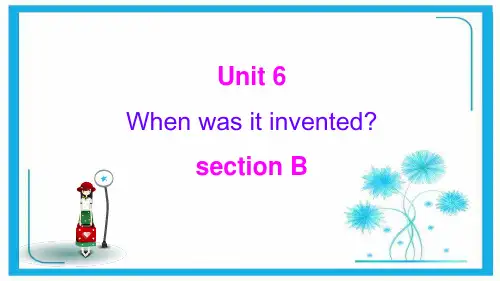

黄金笔记6九年级上册第6单元考情分析:本单元还是在讲被动语态,主要在单选中与动词时态混合考查,在写作与阅读中也常会用到。
1.讲解:一般过去时被动语态的基本构架:was /were+ P.P.(本单元语法)现将动词的被动语态归纳如下——2.被动语态在什么情况下使用?A.不知道或没有必要说明动作的执行者是谁时.We haven’t been told about it.没人通知我们这件事B.强调动作的承受者(这时可带由by引起的短语)The book was written by Mo Yan.C.不愿说出动作的执行者是谁He was asked to give a speech about how to study English well.3.被动语态的注意事项:A.there be 结构没有被动语态B.主句中宾语是反身代词的没有被动语态C.不及物动词没有被动语态1.invent 动词,发明;inventor 名词,发明家;invention 名词,发明2.【了解】在英语中,除了名词所有格“XX’s”表示“···的”之外,of也有“···的”意思。
比如the style of,意为“···的.样式/风格”,the popularity of,意为“···的.普及”3.in style流行的,时髦的;out of style过时的4.make a list列清单5.it is said that,据说···常见的类似词组还有it is believed that···人们认为···;it is reported that···据报告···;it is known that···众所周之···;it is supposed that···据猜测···6.by accident =by chance 偶然地,意外地7.fall into落入,陷入。
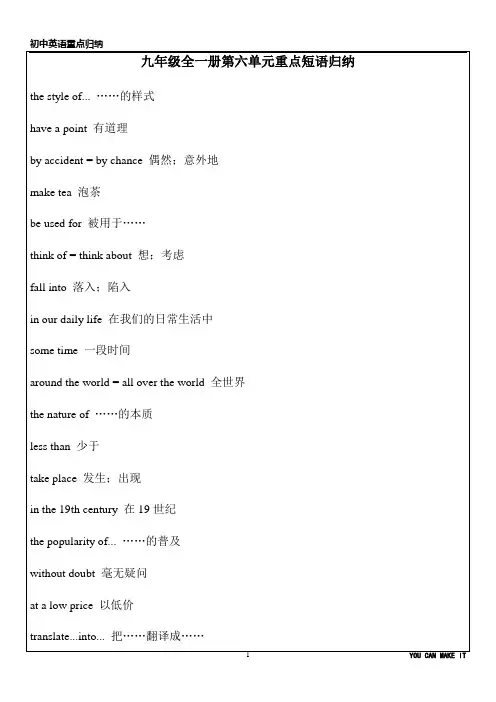
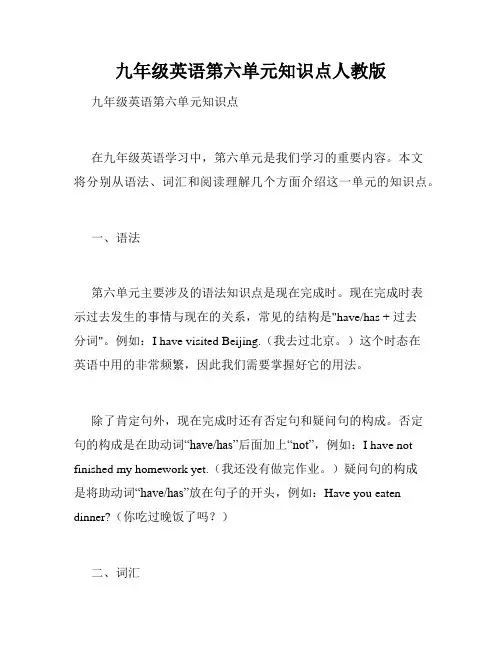
九年级英语第六单元知识点人教版九年级英语第六单元知识点在九年级英语学习中,第六单元是我们学习的重要内容。
本文将分别从语法、词汇和阅读理解几个方面介绍这一单元的知识点。
一、语法第六单元主要涉及的语法知识点是现在完成时。
现在完成时表示过去发生的事情与现在的关系,常见的结构是"have/has + 过去分词"。
例如:I have visited Beijing.(我去过北京。
)这个时态在英语中用的非常频繁,因此我们需要掌握好它的用法。
除了肯定句外,现在完成时还有否定句和疑问句的构成。
否定句的构成是在助动词“have/has”后面加上“not”,例如:I have not finished my homework yet.(我还没有做完作业。
)疑问句的构成是将助动词“have/has”放在句子的开头,例如:Have you eaten dinner?(你吃过晚饭了吗?)二、词汇第六单元的词汇主要包括动词短语和名词短语。
例如,动词短语“look forward to”意思是“期待”,在句子中常用于表示期待将要发生的事情,例如:I am looking forward to the summer vacation.(我期待着暑假。
)名词短语“field trip”意思是“实地考察”,也可用作动词短语,表示“实地考察”。
词汇的积累是学习英语的基础,我们可以通过阅读、听力、写作等多种方式来扩大词汇量。
记忆词汇时,可以运用词语联想、造句等方法,提高记忆效果。
同时,多做一些词汇练习题也能够帮助我们记忆和掌握这些单元的词汇。
三、阅读理解在阅读理解方面,第六单元的重点是阅读理解技巧的提升。
我们需要学会如何从文章中获取信息、理解作者的意图以及推断词义。
对于这些技巧的提升,我们可以通过多读英文文章来培养,增加阅读量,从而提高阅读能力。
此外,我们还可以运用一些阅读理解策略来帮助我们更好地理解文章。
比如,可以先快速浏览文章的标题和每个段落的开头句子,从而获取文章的大意;可以使用问题预测法,先读问题,再带着问题去读文章,找到问题的答案等。
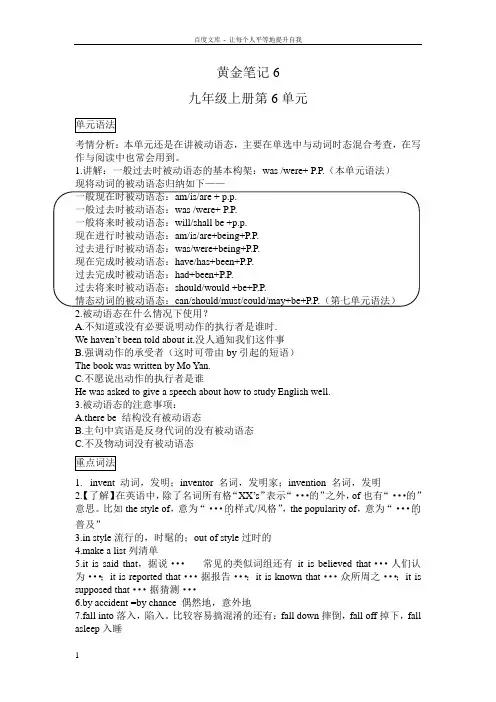
黄金笔记6九年级上册第6单元考情分析:本单元还是在讲被动语态,主要在单选中与动词时态混合考查,在写作与阅读中也常会用到。
1.讲解:一般过去时被动语态的基本构架:was /were+ P.P.(本单元语法)现将动词的被动语态归纳如下——2.被动语态在什么情况下使用?A.不知道或没有必要说明动作的执行者是谁时.We haven’t been told about it.没人通知我们这件事B.强调动作的承受者(这时可带由by引起的短语)The book was written by Mo Yan.C.不愿说出动作的执行者是谁He was asked to give a speech about how to study English well.3.被动语态的注意事项:A.there be 结构没有被动语态B.主句中宾语是反身代词的没有被动语态C.不及物动词没有被动语态1.invent 动词,发明;inventor 名词,发明家;invention 名词,发明2.【了解】在英语中,除了名词所有格“XX’s”表示“···的”之外,of也有“···的”意思。
比如the style of,意为“···的.样式/风格”,the popularity of,意为“···的.普及”3.in style流行的,时髦的;out of style过时的4.make a list列清单5.it is said that,据说···常见的类似词组还有it is believed that···人们认为···;it is reported that···据报告···;it is known that···众所周之···;it is supposed that···据猜测···6.by accident =by chance 偶然地,意外地7.fall into落入,陷入。
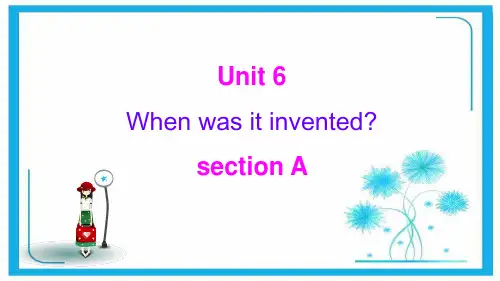
Unit 6 When was it invented? 重点知识归纳解析【重点单词】1. project n. 项目,工程;2. pleasure n. 高兴,愉快;3. daily adj. 日常的,每日的;4. mention v. 提到,说到;5. nearly adv.几乎,差不多;6. boil v. 煮沸,烧开;7. remain v. 保持不变;剩余;8. national adj.国家的,民族的;9. low adj.低的,矮的;10. translate v.翻译;11. lock v.锁上;n. 锁;12. sudden adj. 突然的13. crispy adj. 脆的;酥脆的;14. salty adj.咸的;15. sour adj.酸的,有酸味的;16. customer n.顾客。
17. Canadian 加拿大的,18. divide v.分开,分散;19. hero n英雄,男主角;20. professional adj. 职业的,专业的;【重点词组】1. shoes with special heels 特殊后跟的鞋子2. hot ice cream scoop 热的冰其淋勺子3. run on electricity 电动的4. be used for 被用作5. the subject for my school project 学校项目的课题6. our daily lives 我们的日常生活7. have a point 有点道理8. by accident 偶然,意外地9. over the open fire 在火堆上10. fall into the water 落入水中11. take place 发生12. without doubt 毫无疑问13. at a low price 以一个很低的价格14. translate the book into different language 把书翻译成不同种的语言15. all of sudden 突然16. by mistake 错误地17. a much-loved and active sport 一个深受喜爱并且积极的运动18. divide…into 把…分开19. stop sb from doing sth 阻止某人做某事20. look up to 钦佩,仰慕21. the professional basketball groups 职业篮球机构22. use someone else’s idea 借用其他人的想法【重点句式】1. I think the TV was invented before the car. 我认为电视是在轿车之前发明的。
人教版九年级英语期中复习知识点归纳总结(Unit1-6)九年级Unit 1-6 知识点归纳总结Unit1《How can we become good learners?》知识点【短语归纳】1. have conversations with sb. 同某人谈话2. too…to… 太……而不能3. the secret to… ……的秘诀4. be afraid of doing sth./ be afraid to do sth. 害怕做某事5. look up 查阅6. repeat out loud 大声跟读7. make mistakes in 在……方面犯错误8. connect ……with… 把……和……连接/联系起来9. get bored 感到厌烦10. be stressed out 焦虑不安的11. pay attention to sth./doing sth. 注意;关注12. depend on 取决于;依靠13. the ability to do sth.. 做某事的能力【单元知识点】1. by + doing :通过……方式(by是介词,后面要跟动名词,也就是动词的ing形式)2. talk about 谈论,议论,讨论The students often talk about movie after class. 学生们常常在课后讨论电影。
talk to sb= talk with sb 与某人说话3. 提建议的句子:①What/ how about +doing sth.? 做…怎么样?(about后面要用动词的ing形式)如:What/ How about going shopping?②Why don't you + do sth.? 你为什么不做…?如:Why don't you go shopping?③Why not + do sth. ? 为什么不做…?如:Why not go shopping?④Let's + do sth. 让我们做…吧。
人教版九年级英语第六单元Unit 6 section A+B知识点精讲Section A单词1. style /staɪl/ n.样式;款式典例I like this style. 我喜欢这个样式。
短语in style流行的;时髦的out of style过时的2. project /'prɒdʒekt/ n.项目;工程助记人生无须大project(工程),快乐才是subject(主题),体验才是object(目标)典例an international science project国际科学项目Project Hope希望工程联想subject.主题object.目标3.pleasure /'pleʒə (r)/ n.高兴;愉快助记please(v.使愉快)去e+-ure(名词后缀)= pleasure典例to read for pleasure读书以自娱短语with pleasure当然了/很愿意for pleasure为了消遣;为了娱乐联想pleased adj.高兴的;满意的pleasing adj.令人高兴的;令人满意的谚语Pain past is pleasure.苦尽甘来。
4. daily /'deɪli/ adj.每日的;日常的助记day(n.一天)变y为i+ly(形容词后缀)= daily典例There was little change in their daily lives. 他们的日常生活几乎没有变化。
近义everyday adj.每天的拓展daily还可作名词,意为“日报”。
注意-ly一般用作副词后缀,但是有些以-ly结尾的词是形容词。
常见的词如下:lovely可爱的weekly每周的monthly每月的yearly每年的friendly友好的lonely孤独的5. website /'websaɪt/ n.网站助记web(n.网)+site(n.地点;场所)= website典例There are many websites on the Internet now.现在因特网上有许多网站。
人教版九年级英语第六单元知识点梳理Unit 6 When was it invented?一、短语:1.by accident偶然地;意外地2.without doubt毫无疑问地;的确3.by mistake错误地;无意中4.look up to钦佩;仰慕5.take place发生;出现6.all of a sudden突然;猛地7.divide…into…把……分成8.the Olympics奥林匹克运动会9.the style of……的样式10.since then自从那以后11.knock into撞上(某人)12.travel around周游13.in the sixth century在第6世纪14.all day整天15.in the way这样16.over an open fire在篝火上二、知识点:1.invent v.发明、inventor n.发明家、invention n.发明,可数名词。
2.be used for doing:用来做…(是被动语态)(这个短语的考点有两点,一是它的意思,二是for后面用动名词)。
E.g.Pens are used for writing.笔是用来写的。
3.fall into:落入,掉进 E.g.The leaf fell into the river.叶子落入了河里。
fall down:摔倒E.g.She fell down from her bike.她从她自行车摔倒了。
4.quite:非常adv.与冠词a连用时,冠词a必须放在它的后面。
E.g.She is quite a beautiful girl她是一个十分漂亮的女孩。
5..pleased:adj.高兴的、满意的。
表示外部因素引起人发自内心的欣慰和愉快; pleasant:adj.令人愉快的、舒适的。
指天气、时间、旅行令人高兴和愉快; please:v.使高兴,使同意。
6.battery-operated:adj.电池控制的,是名词+动词的运动分词构成的合成形容词。
人教版九年级英语下册全册各单元必考知识点目录Unit7 知识要点梳理 (2)【重点短语】 (2)【重点句型】 (3)【考点详解】 (4)【重点语法】 (6)Unit8 知识要点梳理 (8)【重点短语】 (8)【重点句型】 (8)【考点详解】 (9)【重点语法】 (12)Unit9 知识要点梳理 (12)【重点短语】 (12)【重点句型】 (13)【考点详解】 (14)Unit10 知识要点梳理 (16)【重点短语】 (16)【重点句型】 (16)【考点详解】 (17)Unit11 知识要点梳理 (21)【重点短语】 (21)【重点句型】 (21)【考点详解】 (22)Unit12 知识要点梳理 (25)【重点短语】 (25)【重点句型】 (25)【考点详解】 (26)【重点语法】 (28)Unit13 知识要点梳理 (30)【重点短语】 (30)【重点句型】 (31)【考点详解】 (31)【重点语法】 (33)Unit14 知识要点梳理 (36)【重点短语】 (36)【重点句型】 (37)【考点详解】 (38)Unit7 知识要点梳理【重点短语】1. be allowed to do sth. 被允许做某事allow sb. to do sth. 允许某人做某事allow doing sth. 允许做某事2. sixteen-year-olds = sixteen-year-old boys and girls 16岁的孩子3. part-time jobs 兼职工作4. a driver’s license 驾照5. on weekends 在周末6. at that age 在那个年龄段7. on school nights 在上学期间的晚上8. stay up 熬夜9. clean up 清扫10. fail(in)a test 考试不及格11. take the test 参加考试12. the other day 前几天13. all my classmates 我所有的同学14. concentrate on 全神贯注于15. be good for 对…...有益16. in groups 成群的,按组17. get noisy 变得吵闹(系表结构)18. learn from 向......学习19. at present 目前,现在20. have an opportunity to do sth. 有做……的机会【重点句型】1. I don’t think twelve-year-olds should be allowed to get their ears pierced.我认为不应该允许12岁的孩子穿耳孔。
黄金笔记6
九年级上册第6单元
考情分析:本单元还是在讲被动语态,主要在单选中与动词时态混合考查,在写作与阅读中也常会用到。
1.讲解:一般过去时被动语态的基本构架:was /were+ P.P.(本单元语法)
现将动词的被动语态归纳如下——
2.被动语态在什么情况下使用?
A.不知道或没有必要说明动作的执行者是谁时.
We haven’t been told about it.没人通知我们这件事
B.强调动作的承受者(这时可带由by引起的短语)
The book was written by Mo Yan.
C.不愿说出动作的执行者是谁
He was asked to give a speech about how to study English well.
3.被动语态的注意事项:
A.there be 结构没有被动语态
B.主句中宾语是反身代词的没有被动语态
C.不及物动词没有被动语态
1.invent 动词,发明;inventor 名词,发明家;invention 名词,发明
2.【了解】在英语中,除了名词所有格“XX’s”表示“···的”之外,of也有“···的”意思。
比如the style of,意为“···的样式/风格”,the popularity of,意为“···的普及”
3.in style流行的,时髦的;out of style过时的
4.make a list列清单
5.it is said that,据说···常见的类似词组还有it is believed that···人们认为···;it is reported that···据报告···;it is known that···众所周之···;it is supposed that···据猜测···
6.by accident =by chance 偶然地,意外地
7.fall into落入,陷入。
比较容易搞混淆的还有:fall down摔倒,fall off掉下,fall asleep入睡
8.辨析:remain是动词,保持不变/仍然是;remind动词,提醒,remind to do sth,remind···of。
She comes to visit us sometimes.她有时来看望我们
Lucy has been to Beijing some times.露西已经去过北京几次了
Jack will leave for America sometime next week.杰克将在下周某个时间动身去美国
10.take place发生,出现
11.【了解】英语中如何表达世纪?如the 1870s ,意为19世纪70年代
12.without doubt= there is no doubt that+句子毫无疑问的
13.at····(low/high)price 意为“以(低价/高价)····的价格”
14.translate··into··把···翻译成····translator名词,翻译家;translation名词,翻译
15.all of a sudden突然,猛地=suddenly
16.by mistake无意中,错误地
17.much-loved 深受喜爱的,复合形容词
18.divide···into···把····分成·····
19.stop···from···阻止····做····
20.dream of/about 梦想···向往····(of/about是介词,后面的动词用-ing 形式)
21.look up to 倾佩/仰慕/抬起头看
22.encourage sb to do sth鼓励某人做某事
23.【理解】thousand与基数词(one,two,three等)连用时必须用单数形式且后面不加of → two thousands(×)two thousands of (×) two thousand of (×) 即:thousands of 只表示大概的数字,意为“数以千计的”,这时可以在-s,后面有介词of ,但绝对不能与数词连用。
本单元的中心话题是inventions,主要谈论发明的历史。
写这类作文要围绕下面几个方面:①谁发明的?②什么时候发明的?③用来做什么的?④怎样被发明的?写作时,一般过去时的被动语态一定要熟练且正确使用。
以“I want to invent ______"为题,写一篇不少于60个词的短文,标点符号不占格
参考词汇:1.It can be used to ...
2.It will be exciting/necessary/helpful ...
范文:
I Want To Invent A Family Doctor Robot
I want to invent a family doctor robot, which can be used to cure(治愈) the illness without going out of their home. As far as I’m concerned(在我看来), it will be helpful and useful because of the following reasons:
First, you can see the doctor immediately at home when you feel sick or get hurt. It can save us a lot of time, especially in emergency situations(紧急情况下). Furthermore(而且,此外), hospitals today are always filled with patients, not everyone can be taken good care of. However, with the help of our robot doctors, you can talk to your personal doctor one to one whenever you want.
In short, family doctor robots can make great contribution to our society.
精彩亮点分析:
亮点一:全文巧用“first, furthermore, in short”等连接词,把家庭机器人医生的好处写的非常清晰,让阅卷老师一目了然。
亮点二:全文采用了定语从句、状语从句、并列句等多种长难句,为文采分增色不少。
亮点三:文中出现了“make contribution to”这些单词及词组,恰到好处地强调了家庭机器人医生的重要性,且为文采再次进行润色。